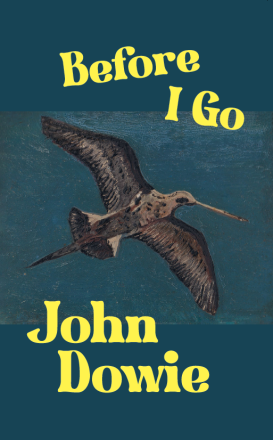
The first time I encountered John Dowie he was on TV. He was a guest on Tony Wilson's trailblazing Granada series So It Goes. While the Sex Pistols famously showed how angry they could be on the show, Dowie wasn't far behind, reciting a poem about hating the Dutch, complaining, if my memory is correct, about various things including how they mince around in clogs.
His new book suggests that he has mellowed a little since those days. Before I Go is an autobiography with a elegiac edge. Dowie is now in his seventies and no longer performs. A sense of his own mortality hangs heavy over the eloquent prose at times. Whether it is discussing the death of his parents Harry and Barbara or having his dog Vodka put down Dowie is a master of the striking image. He talks about his own ageing process and reflects on how when he goes to bed and removes his hearing aid, glasses and teeth half of his own face seems to be looking back at him.
He is also very good on his mother's dementia, finding humour as well as sadness in the condition. Every day he would visit her with a copy of the Daily Mail which she would read and then instantly forget. After a while he concluded he could easily save money – just take the paper home, iron it and bring the same one in on every visit.
Dowie is one of those figures from the comedy world who is both hugely important and somewhat marginalised. Before I Go takes us from his childhood in Birmingham to his early performance days when if he got more than one laugh he was doing well. He puts his failure partially down to his penchant for the "under-joke", the witty quip that he knows its not a zinger but cannot resist including in his set.
This was, however, before the alternative comedy boom. Dowie was one of those pioneers who wanted to make people giggle but didn't want to wear a frilly shirt and bowtie and tell mother-in-law jokes. He might not have been a Connolly or a Carrot but he did slowly make some headway, working the arts centre circuit and gigging with bands, which brought him some success but not much satisfaction.
Dowie, while ambitious, always seems to have had a reticence about mainstream popularity. When the new wave of comedy did take off in the early eighties he could have clung to its coat-tails but he always felt uncomfortable. In fact instead of capitalising on the demand for stand-up he gave it up, instead working more in fringe theatre, where he fared quite well, particularly with his children's work Dogman.
Dowie writes powerfully about the importance of trying to be a good parent. In fact there's something beautifully childlike – in a Good Way – about Dowie's writing. Some of his poetry, about the sadness in Toy Story, or why you should be wary of marrying princes who are actually toads, is included here and it is up there with the work of John Hegley, who to me seems like a kindred spirit (as was the late Neil Innes and the also late Ken Campbell – Dowie worked with both).
For Dowie children have a special insight into life that can be lost in adulthood. The secret is to retain it. Which is something Dowie, now in his mid-seventies, has certainly succeeded in doing.
Buy Before I Go here.



